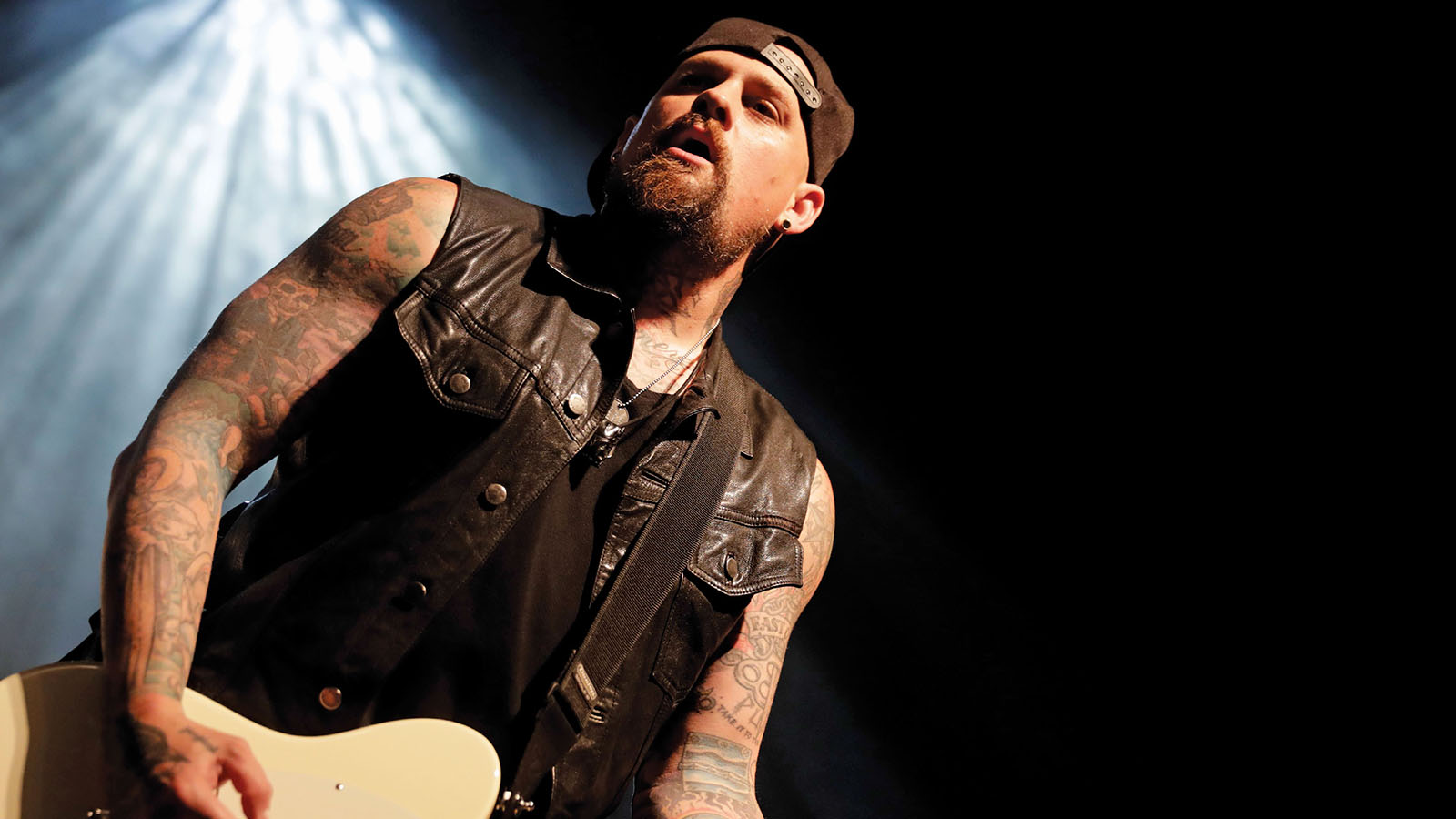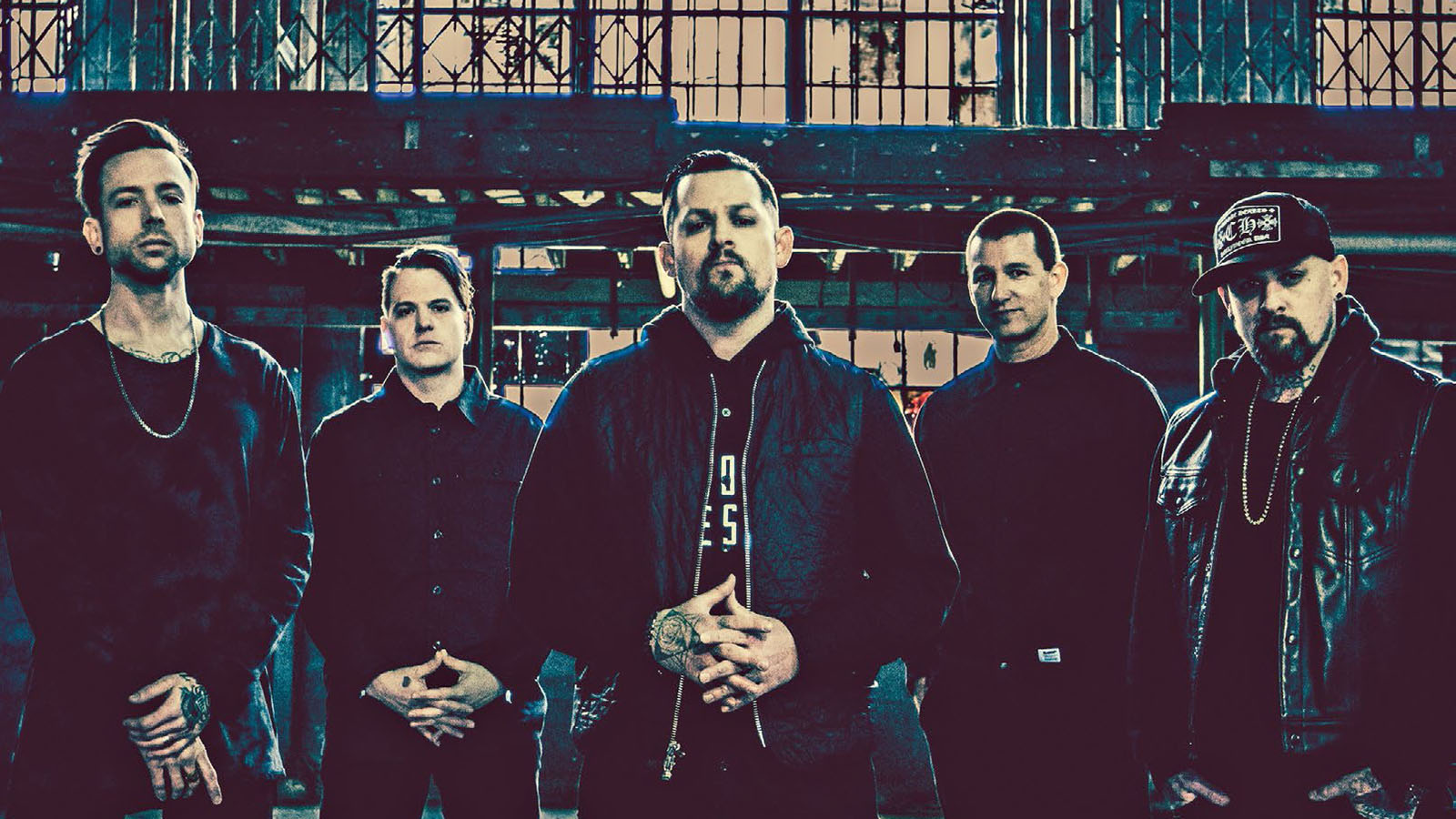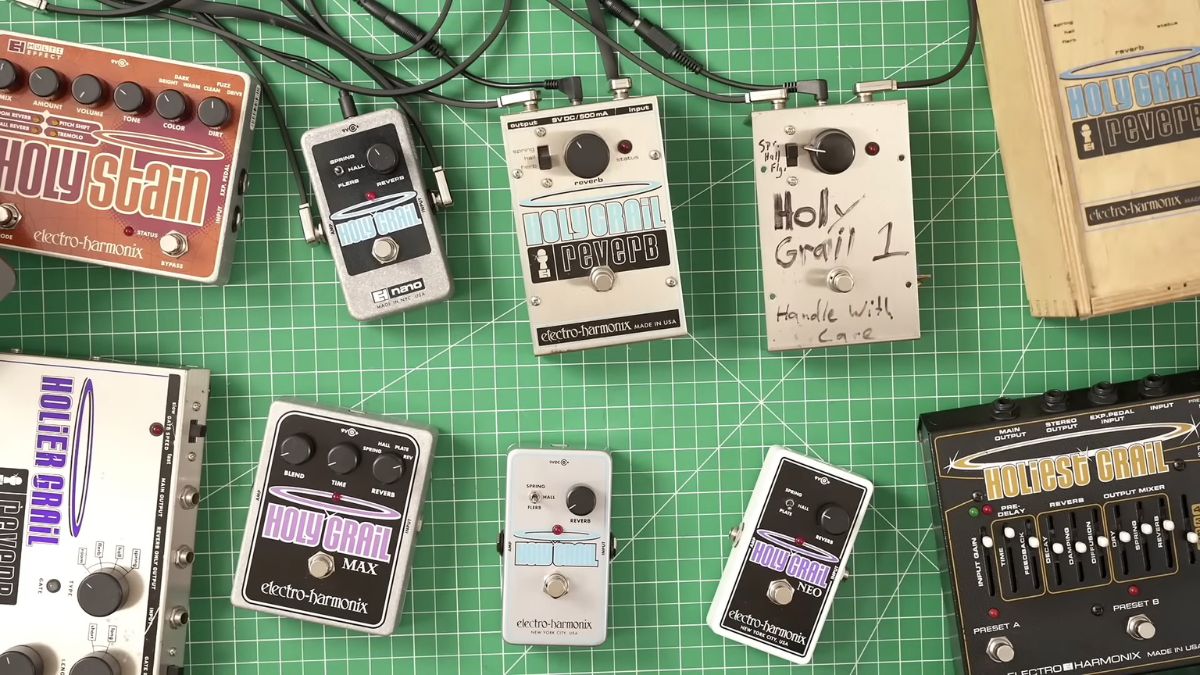Good Charlotte's Benji Madden and Billy Martin Dive Deep Into Their New Album, 'Generation Rx'
"It’s a heavier record than we’ve ever done."

“We started Good Charlotte in 1996 — 22 years ago,” says guitarist Benji Madden. “We were just kids at the time. I mean, we had never been on an airplane until we had a record deal. So back then we were just going on instinct.”
That instinct has served Good Charlotte, who initially burst onto the scene as part of the late-Nineties pop-punk explosion, quite well. Over the course of their more than two decades together, the band — which also features Benji’s identical twin brother, Joel Madden, on vocals, guitarist Billy Martin, bassist Paul Thomas and drummer Dean Butterworth, who joined in 2005 — have released several gold-and platinum-certified albums, including 2002’s multi-million-selling The Young and the Hopeless, which produced era-defining hit singles like “Lifestyles of the Rich & Famous” and “The Anthem,” and crisscrossed the globe on various world tours.
But at some point, Madden, now 39, says, “We came to this realization that if we were going to continue with this band and enjoy it and be authentic, we had to be honest with our fans about who we are in any given moment. So when we made this new record I remember having a conversation with the band — ‘I don’t want to make new music that it feels like I have to make. I want to make music that I need to make.’ And we all agreed on that. We decided ‘This record really just has to be for us.’ ”
That record is the new Generation Rx, Good Charlotte’s seventh full-length overall. Lyrically, it finds the band digging deep, exploring everything from drug use (“Actual Pain”) to violence and its aftereffects (“Prayers”) to child abuse (“Better Demos”) to self-hatred (“Shadowboxer”). And the weighty subject matter is paired with some of the band’s heaviest music to date — not just in terms of the thick-toned, crushing riffs that fuel songs like “Self Help” and the aforementioned “Shadowboxer,” but also in the band’s use of melancholic orchestral strings (“California [The Way I Say I Love You]”) and somber piano shadings (“Cold Song”).
“The darker music made sense alongside the deep lyrics,” co-guitarist Martin says. “They kind of vibe off each other. It was definitely an intentional thing.”
The goal, Madden explains, is just to make people feel something. “To me, Generation Rx is this distracted generation,” he says. “There’s always a distraction to get you away from thinking about your feelings. There’s always something you can take to numb them. There’s always something you can do to forget about them or run from them.
“But for us, music has always been the thing we’ve used to deal with the pain and trauma and struggles in our lives. So with this record we wanted to get back in touch with our own feelings in the hope that, in sharing this music, there will be people out there who can relate to it.”
All the latest guitar news, interviews, lessons, reviews, deals and more, direct to your inbox!
![[from left] Billy Martin, Joel Madden, Benji Madden, Dean Butterworth and Paul Thomas](https://cdn.mos.cms.futurecdn.net/KGAhyTgA2QuzAGgtbSoNfS.jpg)
How did Generation Rx come together?
BENJI MADDEN The cool thing about this record is that when we went in to write, Joel and I were just like, “We’re not going to have a specific subject, we’re not going to have a guideline. We’re just going to write stream-of-consciousness and let whatever is going on inside of us come out.” We wrote the guitar riffs we were feeling in the moment, and we saw what kind of emotional content that pulled out of us. We asked ourselves, “What does our subconscious want to say right now? What’s down in there that needs to be said that’s going to feel really cathartic to release and get out there?”
BILLY MARTIN Another thing is we were like, “Okay, let’s write songs that we’re really excited about playing live so that regardless of whether something is a single or not, it’s going to translate well onstage.” I think a lot of bands, the older they get, the softer they get. I’ve definitely seen that trend with a lot of my favorite bands. But we thought it’d be cool to make the hardest record we’d ever made.
There’s some heavy subject matter this time around. How did it come about?
MARTIN I think a lot of it stems from the fact that the last couple of tours we did before this record, we would do meet-and-greets and fans would hit us with these really heavy stories. They would tell us how our music was, like, a savior to them and they wanted to thank us. It’s awesome to hear that kind of thing, and so after these meet-and-greets we’d be talking and I remember Joel saying, “On this next record, we have to go deep. Because we’ve kind of strayed away from that.” That was a big part of early Good Charlotte records, but toward some of our middle-career records the lyrics got less personal. But I think with this record we wanted to connect with fans on that same level that we did when the band was first starting out.
MADDEN All of this subject matter is stuff we’ve dealt with in our childhoods, our youth or our adult life. And we felt a lot of these conversations needed to be normalized, so that someone could turn to their friend and go, “Yeah, I struggle with depression,” and not have that be an uncomfortable conversation. I think so many people have grown up with violence in their homes, with mental illness in their homes, with drugs in their homes. And now we have the opioid epidemic all around us. I don’t know anyone who hasn’t been affected by these things. We need to be able to talk about them.
Musically, Generation Rx is a heavier record for you guys. Was that a result of the more serious subject matter you were exploring?
MADDEN The music definitely was important, in terms of pulling out the lyrics. And it was just a natural expression of where we were at. But I do think this is more of a straightforward rock record. And I also think it’s a heavier record than we’ve ever done. But it all worked together to pull out this lyrical and melodic content.
At the same time, there’s also a lot of varied sounds and instrumentation. There’s orchestral strings. There’s piano. There’s acoustic guitar. You’re pushing out on your boundaries, stylistically.
MADDEN Yeah, that’s true. But we’re always looking for new vibes and energy. That’s exciting to us. I’ve always felt that we’re a band that’s a bit tough to put into any one genre. If you listen back to our early records, we played all kinds of styles. And a record like Good Morning Revival, there were some dance songs on that album, and that came out in 2007, before EDM broke, before pop went rhythmic. And then we also had the collaboration with Avenged Sevenfold on that album, on the song “The River.” It’s like, who would have ever thought to put Avenged and Good Charlotte together? But it was just a cool moment. And that’s what we’re after — cool moments.
What was your main setup on Generation Rx?
MADDEN My main guitar was a John Suhr Bengal [Burst] Tele. It’s beautiful. I used that on pretty much everything. And then I had a Gibson Custom Shop Les Paul Standard. I did the rhythm tracks with a Sol-dano Hot Rod 100 and a Laney Ironheart, and I had an early Nineties Matchless that I used for a lot of the cleaner, more chime-y stuff. And I have a few pedals, but I prefer to use just straight amp distortion as much as possible.
MARTIN I’ve been playing PRS since I was, like, 16, and so I used a lot of PRS stuff. But I always say that whatever sounds best in the studio is what I’m going to use. So there was also Les Pauls and Teles on this record. And we had a couple of really nice old Marshall JCM 800s, and we did some demoing with Kempers.
I’m really into effects — growing up, Korn was really big for me. Incubus was really big. Limp Bizkit. And some of those guys, like [Limp Bizkit’s] Wes [Borland] and [Korn’s] Head and Munky, they were big on effects and weird noises and stuff like that. So that’s a big part of my style. And with this record I wanted to go back and use some of the pedals that made me fall in love with playing guitar when I was in high school. Stuff like the DigiTech Whammy, which was a big sound in the late Nineties. I used that on maybe three tracks on the record. And the Boss Super Phaser, the bright green one — I used that one a lot. So there are definitely some cool sounds on this one.

When Good Charlotte first came on the scene in the late Nineties and early 2000s you were firmly identified as a pop-punk band. But that’s not really who you are anymore.
MADDEN Well, when we came out, it was ’98, ’99, and music at that time felt very manufactured. To me, the music that felt the realest was what the punk bands were doing, and so that was what we gravitated toward. I think our instincts were that we could only relate to shit where it felt like the person singing it had lived it. So we started playing with all the punk bands and the pop-punk bands because that was where we felt comfortable. But that’s not to say we were a punk band. I think we had a lot of that spirit and shared some similar core values, but at the same time I was inspired by, you know, Cash Money and everything that was going on in that rap scene. I was blown away by how those guys grew up poor and then they celebrated having all these nice things and all this success. Because for me, my number-one goal was that I wanted to buy my mom a house. I wanted to put her in a nice car and a nice home and not have people look at her like she was a poor person, which was something we experienced as kids.
And so we had this really interesting mix between our ethos and our core values and then also our drive and our desire to succeed and take care of our families. Whereas some other bands came from very well-to-do families and had graduated from college. So we were in a weird little place of our own of being in the punk scene and being accepted by a lot of them, but also being a little alienated from that. We had to carve out our own path. And we did that for over 20 years. And now we’re just our own thing. Now, everybody just knows Good Charlotte as Good Charlotte.
MARTIN Early on, we tried to do that pop-punk thing because I think it was the easiest genre to put Good Charlotte into. But that’s not the genre we thought we would get put into when the first record came out. It was surprising to us. And I would always say straight-up that I didn’t listen to any of that stuff. I didn’t think I needed punk cred to make music. But the cool thing about Good Charlotte is that we all like different stuff. And so a song like “I Just Wanna Live” [from 2004’s The Chronicles of Life and Death] has a hip-hop loop and sub-bass in it. A song like “Dance Floor Anthem” [from Good Morning Revival] has a very kind of dance feel to it. And a song like “Keep Your Hands Off My Girl” ([Good Morning Revival] is really different from anything else we’ve done. We take pride in that. I feel like those songs are songs that only Good Charlotte could do.
It would seem to be a difficult thing to start out in that pop-punk world and then grow up and grow older and have your fans follow you on that journey. But you’ve been able to do that. How?
MARTIN I wish I knew the magic answer to that. I just think you have to know how to weather the storms. You have to accept that there’s going to be ups and downs in your career. I think a lot of young bands, when they achieve success, everything’s awesome. But then the first moment things take a step backwards or don’t go like they think they’re going to go, they go into panic mode and start pointing fingers and placing blame and things start to crumble and fall apart. But the four of us have been together in the band for almost 20 years, and our drummer, Dean, has been in the band for 12 or 13 years now. So we’ve been through a lot of stuff together and we have a pretty tight bond. We respect each other within the band as well as outside of the band. We’re all humans and we all have our own lives. But when we show up and get together we’re all there playing for the same reason.
MADDEN One thing I would say, if I can give any young artist any advice, is you’ve got to learn to follow your instincts, because that’s the only thing that’s going to guide you. There’s not an A&R guy that’s going to do it, or a producer or a label person or whoever. As an artist you have to learn to shut out the noise and follow your instincts. You can’t look outward for what you have to do. You have to look inward. Because if you look outward you’re just going to end up doing something that’s inauthentic to yourself. So I think for us, our longevity can be attributed to just sticking it out and following our instincts. If you work your ass off and you just don’t quit, you’ll probably find some sort of longevity. Because everything is ever-evolving, you know? I don’t think you get anywhere and go, “Okay, we’re here.” The journey’s the destination.
Rich is the co-author of the best-selling Nöthin' But a Good Time: The Uncensored History of the '80s Hard Rock Explosion. He is also a recording and performing musician, and a former editor of Guitar World magazine and executive editor of Guitar Aficionado magazine. He has authored several additional books, among them Kurt Cobain: Montage of Heck, the companion to the documentary of the same name.

